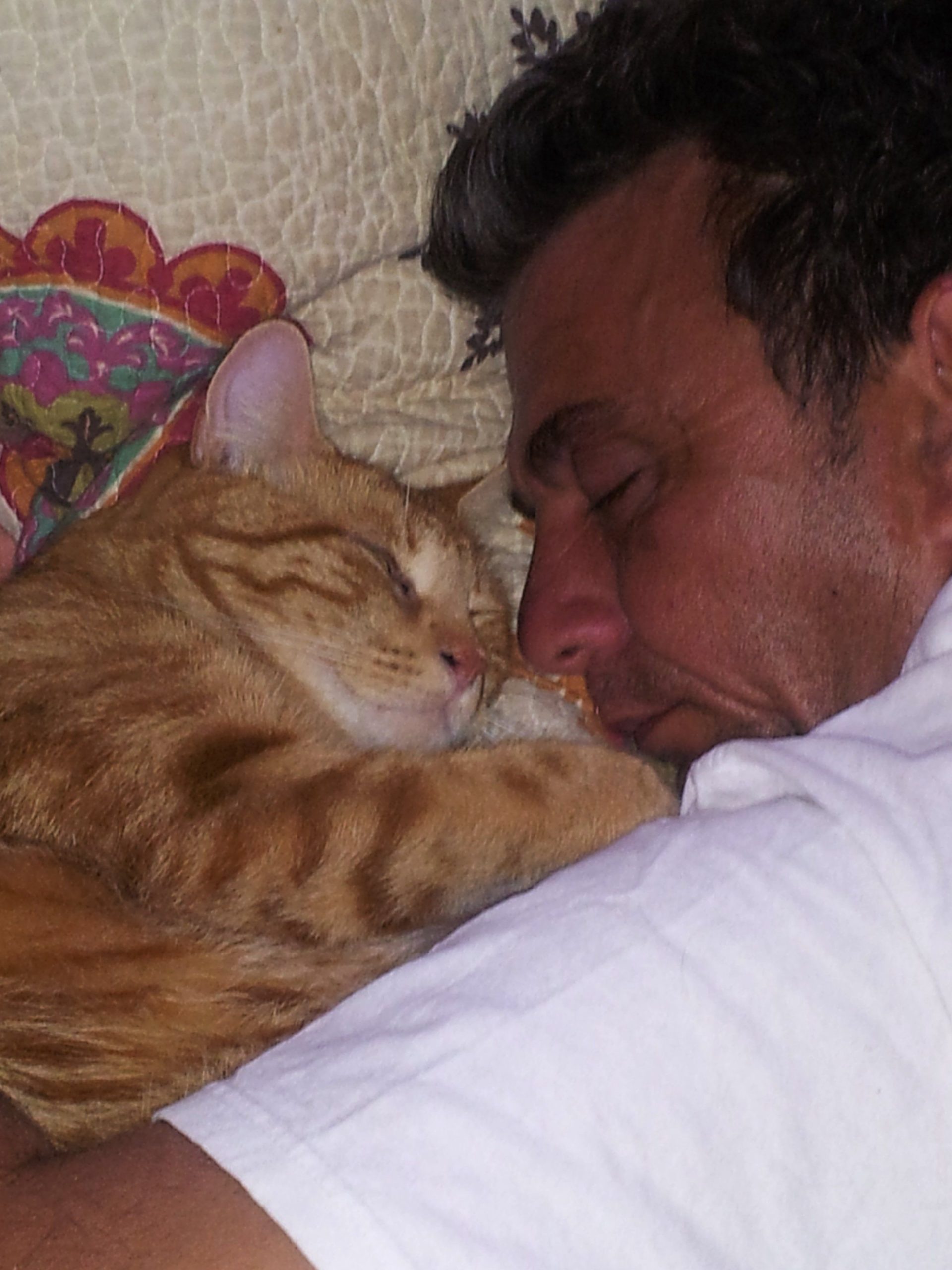Contents
- I. Introduction to Maine Coons
- II. Physical Characteristics of Maine Coons
- III. Behavioral Traits of Maine Coons
- IV. Why Do Maine Coons Lay On Their Backs?
- V. Understanding the Reasons Behind Maine Coons’ Behavior
- VI. The Benefits of Maine Coons Laying On Their Backs
- VII. Frequently Asked Questions about Maine Coons’ Behavior
- 1. Are Maine Coons known for being friendly?
- 2. Do Maine Coons get along well with other pets?
- 3. Do Maine Coons like to play?
- 4. Are Maine Coons lap cats?
- 5. Do Maine Coons like water?
- 6. Are Maine Coons vocal cats?
- 7. Do Maine Coons enjoy being brushed?
- 8. Are Maine Coons good with children?
- 9. Do Maine Coons like to climb and explore high places?
- 10. Are Maine Coons independent cats?
I. Introduction to Maine Coons

Maine Coons are a popular and fascinating breed of cat known for their large size, tufted ears, and bushy tails. These majestic felines have captured the hearts of many cat lovers around the world with their friendly and gentle nature. In this article, we will explore the unique characteristics and traits of Maine Coons, shedding light on why they often lay on their backs.
Maine Coons: Origins and History
The Maine Coon breed is believed to have originated in the United States, specifically in the state of Maine. It is said that these cats evolved naturally over time, adapting to the harsh winter climate of the region. With their muscular bodies and long, water-repellent coats, Maine Coons are well-suited for surviving in cold and snowy conditions.
Legend has it that Maine Coons are the result of a romantic affair between domesticated cats and raccoons, hence their name. While this story is purely mythical, it adds to the allure and charm of these magnificent creatures.
Maine Coons: Physical Characteristics
Maine Coons are known for their impressive size, often weighing between 12 and 20 pounds. Their large bodies are complemented by muscular legs and broad chests. These cats have a rectangular body shape, with long tails that are often carried proudly and elegantly.
One of the most distinguishing features of Maine Coons is their tufted ears. These adorable ear tufts add to their wild and majestic appearance. Additionally, Maine Coons have large, expressive eyes that come in various colors, including green, gold, and copper.
Maine Coons: Personality Traits
Maine Coons are beloved for their friendly and sociable nature. They are known to be excellent companions and are often described as “gentle giants.” These cats are highly intelligent and curious, making them great explorers of their surroundings.
Despite their large size, Maine Coons are gentle and patient, particularly with children and other animals. They have a playful side and enjoy interactive toys and games. Maine Coons also have a sweet and loving disposition, often seeking affection from their human companions.
Maine Coons: Laying on Their Backs
One fascinating behavior often observed in Maine Coons is their tendency to lay on their backs. This behavior is a display of trust and contentment. When a Maine Coon lays on its back, exposing its belly, it is a sign that they feel safe and comfortable in their environment. It also indicates their willingness to engage in play or receive gentle belly rubs.
While not all Maine Coons exhibit this behavior, it is a common trait among the breed. It is important to approach a Maine Coon that is lying on its back with care and respect, as they may not appreciate being touched in that vulnerable position.
II. Physical Characteristics of Maine Coons

Maine Coons are known for their large size and unique physical attributes. Here are some of the key characteristics that distinguish this breed:
1. Impressive Size and Stature
Maine Coons are one of the largest domesticated cat breeds. They have a long, rectangular body with a solid bone structure. Adult males can weigh anywhere between 13 and 18 pounds, while females typically weigh between 8 and 12 pounds. Their size alone commands attention and admiration.
2. Luxurious Coat
Maine Coons possess a thick and shaggy coat that helps them adapt to harsh weather conditions. Their fur is water-resistant and has a silky texture, making it easy to maintain. The coat comes in various colors and patterns, including solid, tabby, tortoiseshell, and calico.
3. Distinctive Lynx-like Ear Tufts
One of the most striking features of Maine Coons is their tufted ears. These tufts resemble those of a lynx, with long, wispy fur adorning the tips. Aside from adding to their overall majestic appearance, these ear tufts serve a practical purpose by protecting their ears from debris and cold weather.
4. Large, Expressive Eyes
Maine Coons are known for their large, round eyes that are set slightly at an angle. Their eyes come in an array of colors, including gold, green, and copper. These expressive eyes can captivate anyone with their intense gaze, often reflecting the cat’s intelligence and curiosity.
5. Strong, Muscular Build
With their sturdy musculature, Maine Coons possess a powerful and agile physique. Their bodies are well-proportioned, allowing them to excel in various physical activities such as climbing and jumping. This athleticism, combined with their size, makes Maine Coons an impressive sight to behold.
The physical characteristics of Maine Coons contribute to their unique charm and appeal. Their grand size, luxurious coat, lynx-like ear tufts, expressive eyes, and muscular build collectively make them a breed that stands out from the rest. If you’re looking for a feline companion that exudes both elegance and strength, the Maine Coon is an ideal choice.
III. Behavioral Traits of Maine Coons

Maine Coons are known for their unique behavioral traits that set them apart from other cat breeds. Here are some interesting characteristics that make them so special:
1. Playfulness and Curiosity
Maine Coons are highly playful and curious creatures. They love exploring their surroundings and are always on the lookout for new adventures. Their curiosity often leads them to investigate every nook and cranny of their environment, keeping themselves entertained for hours on end.
2. Social Nature
Maine Coons are renowned for their sociable and friendly nature. Unlike some other cat breeds, they enjoy the company of both humans and other pets. They are often referred to as “gentle giants” due to their affectionate and gentle demeanor. Maine Coons are loyal companions who will gladly curl up in your lap or follow you around the house.
3. Intelligence and Problem-Solving Skills
Maine Coons are highly intelligent cats. They have excellent problem-solving skills and can quickly figure out how to navigate tricky situations. This intelligence also makes them easily trainable, and they can learn tricks and commands with patience and positive reinforcement.
4. Communication Skills
Maine Coons are not shy when it comes to communicating their needs and desires. They are known for their wide range of vocalizations, from meows and chirps to trills and purrs. They will often engage in conversations with their owners, adding an extra level of interaction and companionship.
5. Water Fascination
Unlike most cats, Maine Coons have a special fascination with water. They are not afraid to get wet and might even join you in the shower or playfully dip their paws in the sink. This unique trait is believed to have originated from their ancestors’ experiences in the harsh Maine climate, where they needed to fish in rivers and ponds.
IV. Why Do Maine Coons Lay On Their Backs?

Maine Coons are known for their unique behavior of lying on their backs. This adorable and amusing posture is not only entertaining to watch, but it also serves various purposes in the feline world. Let’s delve into the reasons why Maine Coons enjoy lounging on their backs.
1. Stretching and Flexibility
When Maine Coons lie on their backs, they are often engaging in a good stretch, similar to how humans might stretch their muscles after a long day. Stretching is essential for a cat’s flexibility and helps to keep their muscles and joints healthy.
2. Temperature Regulation
Maine Coons have a thick, long coat that requires regular grooming. By lying on their backs, they expose their belly to the air, which helps to cool them down. This behavior is especially common during warm weather or when they’ve been engaging in physical activity.
3. Trust and Vulnerability
When a Maine Coon lies on its back, it is a sign that they feel safe and secure in their environment. This posture exposes their vulnerable belly, which is a sensitive area for cats. By showing their belly, Maine Coons are displaying trust and a sense of comfort in their surroundings.
4. Attention Seeking
Maine Coons are social cats and thrive on human interaction. Lying on their backs can be a way for them to seek attention and affection from their owners. By exposing their belly, they are inviting their humans to give them belly rubs and scratches, which most Maine Coons absolutely adore.
5. Playfulness and Amusement
Maine Coons are known for their playful nature, and lying on their backs can be part of their playtime antics. It could be a way for them to initiate play with their owners or other pets in the household. Maine Coons are intelligent cats, and they often find creative ways to entertain themselves and those around them.
V. Understanding the Reasons Behind Maine Coons’ Behavior

Maine Coons are known for their unique behaviors that set them apart from other cat breeds. These behaviors can be intriguing and sometimes puzzling for cat owners. In this section, we will explore some of the reasons behind the behavior of Maine Coon cats.
1. Playful Nature
Maine Coons have a reputation for being playful and active. This behavior can be attributed to their high energy levels and natural curiosity. They enjoy interactive play and are often seen chasing toys, climbing trees, and even playing fetch. The playful nature of Maine Coons may stem from their hunting instincts, as they were originally bred as working cats on farms.
2. Socialization
Maine Coons are known to be social cats that enjoy the company of their human family members. They are often seen following their owners around the house, joining them in various activities, and even demanding attention. This behavior can be attributed to their strong bond with their owners and their need for social interaction. Maine Coons thrive in a loving and engaging environment.
3. Affectionate Gestures
Maine Coons are known for their affectionate nature and their unique way of showing love. One common behavior is when they lay on their backs and expose their bellies. This gesture is a sign of trust and contentment. When a Maine Coon exposes its belly, it is an invitation for gentle belly rubs and a display of vulnerability. It is important to approach this gesture with care and respect the cat’s boundaries.
4. Communication through Vocalization
Maine Coons have a wide range of vocalizations that they use to communicate with their owners. From soft chirps and trills to loud meows and purrs, they are not shy about expressing their needs and desires. This behavior can be a way for Maine Coons to seek attention, express hunger or discomfort, or simply engage in conversation with their human companions.
5. Independent Nature
Maine Coons are known for their independent streak. While they enjoy the company of their human family members, they also value their alone time. This behavior can be attributed to their origins as working cats that had to rely on their own instincts and skills. Maine Coons are capable of entertaining themselves and can often be seen exploring their surroundings or enjoying a quiet moment on their own.
Understanding the reasons behind Maine Coons’ behavior can help cat owners create a nurturing and harmonious environment for their feline companions. By embracing their unique traits, providing them with plenty of playtime, socialization, and affection, and respecting their independence, Maine Coon owners can form a strong and fulfilling bond with their beloved pets.
VI. The Benefits of Maine Coons Laying On Their Backs
Maine Coon cats are known for their unique behavior, and one of the most endearing poses they often assume is lying on their backs. While it may seem strange to see a cat in such a vulnerable position, there are actually several benefits to this behavior.
1. Stretching and Flexibility
When Maine Coons lay on their backs, they have the opportunity to stretch and flex their muscles. This position allows them to extend their limbs fully and engage in a deep stretch that helps to maintain their flexibility. It is especially important for large and active cats like Maine Coons to keep their muscles supple and prevent any stiffness or discomfort.
2. Thermoregulation
Maine Coons have a thick coat that keeps them warm, but they also have a long belly fur that can act as a cooling mechanism. When they lay on their backs, their belly fur is exposed to the air, allowing for better heat dissipation. This can be particularly beneficial during warmer months or in households where the temperature is higher than usual.
3. Relaxation and Comfort
Just like humans, cats also enjoy moments of relaxation and comfort. Lying on their backs provides a sense of security and allows them to fully relax and let go. It is a vulnerable position, so when Maine Coons feel safe and comfortable in their environment, they are more likely to assume this posture. It is a sign that they trust their surroundings and feel at ease.
4. Social Interaction
Maine Coons are known for their friendly and sociable nature. When they lie on their backs, it can be an invitation for human or feline companions to engage in play or belly rubs. It is their way of expressing trust and a desire for interaction. By assuming this position, Maine Coons are signaling that they are open to bonding and connection.
5. Playfulness and Amusement
Maine Coons are playful cats by nature, and lying on their backs can be a playful posture for them. It allows them to engage in self-amusement by kicking and batting at objects with their paws. This behavior can be entertaining not only for the cats themselves but also for their owners who get to witness their playful antics.
VII. Frequently Asked Questions about Maine Coons’ Behavior
VII. Frequently Asked Questions about Maine Coons’ Behavior
1. Are Maine Coons known for being friendly?
Maine Coons are known for their friendly and sociable nature. They are often referred to as the “gentle giants” of the cat world due to their friendly and outgoing personalities. They enjoy being around people and are great companions.
2. Do Maine Coons get along well with other pets?
Maine Coons are generally good with other pets, including dogs and other cats. They are known for their tolerance and adaptability, making them compatible with different animals. However, it’s important to introduce them properly and provide gradual socialization to ensure a harmonious relationship.
3. Do Maine Coons like to play?
Yes, Maine Coons are playful cats. They have a playful and curious nature, which makes them enjoy interactive playtime. They are often seen chasing toys, playing with puzzle feeders, and even playing fetch. Engaging in play is not only entertaining for them but also provides mental and physical stimulation.
4. Are Maine Coons lap cats?
Maine Coons can be lap cats, but it ultimately depends on their individual personality. While some Maine Coons enjoy sitting on their owner’s lap and receiving attention, others may prefer to be close by rather than directly on their lap. It’s important to respect their preferences and provide them with comfortable spaces to relax.
5. Do Maine Coons like water?
Maine Coons have a reputation for being fond of water. Many Maine Coons enjoy playing with water, whether it’s dipping their paws in a water bowl or even joining their owners in the shower. This could be attributed to their water-resistant coat and their ancestors’ history of being skilled hunters in water-rich environments.
6. Are Maine Coons vocal cats?
Maine Coons are known for their chirping, trilling, and meowing. While they are not as vocal as some other cat breeds, they do communicate through various vocalizations. They may use different sounds to express their needs, greet their owners, or seek attention. Each Maine Coon may have its unique vocal repertoire.
7. Do Maine Coons enjoy being brushed?
Maine Coons generally enjoy being groomed and often find the experience pleasant. Their thick and long fur requires regular brushing to prevent tangles and mats. Brushing not only helps maintain their coat but also provides an opportunity for bonding between the cat and its owner.
8. Are Maine Coons good with children?
Yes, Maine Coons are generally good with children. They are known for their gentle and patient nature, making them suitable companions for families with kids. However, as with any interaction between pets and children, supervision and teaching children how to properly handle and respect cats is important to ensure the safety and well-being of both the child and the cat.
9. Do Maine Coons like to climb and explore high places?
Maine Coons are natural climbers and explorers. They have a strong curiosity and love to observe their surroundings from elevated positions. Providing them with cat trees, shelves, or other vertical spaces to climb and explore can help satisfy their innate instincts and keep them mentally stimulated.
10. Are Maine Coons independent cats?
Maine Coons have an independent streak but are also known for their sociable nature. While they may enjoy some alone time, they typically prefer being around their human companions. They often seek attention, enjoy being part of family activities, and are well-suited to households where they can receive love and interaction.

Jackson is an accomplished content writer with a flair for captivating storytelling. With a Bachelor’s degree in English Literature from the prestigious University of California, Berkeley, Hunter’s educational background has honed his writing skills to perfection. His love for felines is evident in his extensive knowledge of cat behavior and care, making him an expert in the field. Hunter’s passion for cats has led him to contribute insightful articles to various online platforms, providing valuable information and tips to cat owners worldwide. With his exceptional writing abilities and deep understanding of cats, Hunter continues to create engaging content that resonates with readers and leaves a lasting impact.
